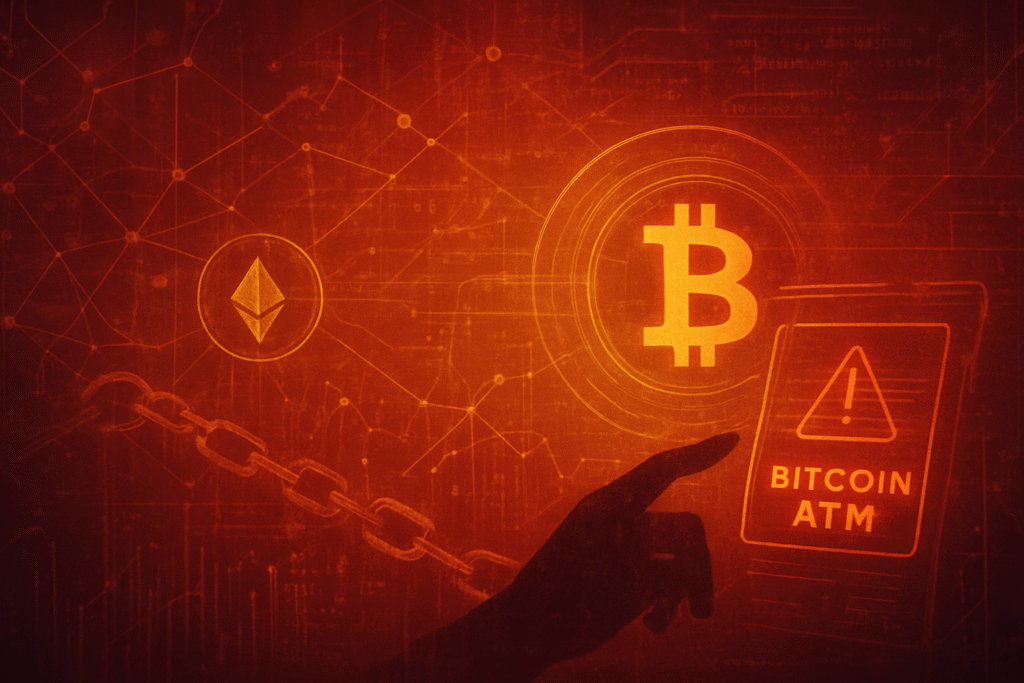
The cryptocurrency ecosystem is grappling with a severe and escalating crisis: a dramatic surge in scams, particularly those leveraging Bitcoin ATMs to defraud vulnerable senior citizens. As of late 2025, alarming statistics reveal billions of dollars in losses, with older adults disproportionately targeted, suffering devastating financial and emotional consequences. This pervasive fraud not only wipes out life savings but also casts a long shadow over the nascent industry, eroding public trust, hindering mainstream adoption, and intensifying calls for stringent regulatory oversight. The immediate reaction from consumer protection agencies, law enforcement, and parts of the crypto community has been one of alarm, recognizing that the integrity and future viability of digital assets hinge on effectively combating these predatory schemes.
The alarming rise in these scams, especially over the past two years, underscores a critical vulnerability in the rapidly evolving digital finance landscape. Scammers exploit seniors' limited familiarity with cryptocurrency, combining it with sophisticated social engineering tactics to create a climate of fear and urgency. This issue matters profoundly for the crypto ecosystem because it directly undermines the foundational promise of a secure and transparent financial future that blockchain technology purports to offer. Without robust measures to protect users, particularly the most vulnerable, the widespread adoption of legitimate crypto innovations will remain severely hampered, and the industry risks being perpetually associated with illicit activities rather than revolutionary financial progress.
Market Impact and Regulatory Scrutiny Intensify
While direct price movements of specific tokens due to these scams are less pronounced, the cumulative effect of widespread cryptocurrency fraud has significantly impacted overall market sentiment and investor confidence. The continuous stream of negative headlines, particularly those detailing the financial devastation of seniors, fuels skepticism among potential new investors and reinforces the perception of crypto as a high-risk, unregulated frontier. This erosion of trust manifests in cautious investment behavior, with studies indicating that victims of crypto fraud tend to reduce their investments on similar platforms by approximately 36.5% for at least a year. This sustained lack of confidence can impede market growth, deter institutional investment, and slow the broader integration of digital assets into the global financial system.
The escalating financial losses have unequivocally intensified regulatory scrutiny worldwide. Governments and regulatory bodies are increasingly viewing cryptocurrencies as conduits for illegality and fraud, necessitating stricter measures. The U.S. Securities and Exchange Commission (SEC) and the Commodity Futures Trading Commission (CFTC) have ramped up enforcement actions against fraudulent schemes, with the SEC bringing its first actions specifically targeting "relationship investment scams" (often referred to as "pig butchering") in September 2024. The CFTC, in collaboration with the Department of Justice and FBI, has made combating crypto scams a key enforcement priority, issuing customer advisories and holding inaugural Fraud Disruption meetings in July 2024.
Globally, comprehensive legislative frameworks are emerging. The European Union's Markets in Crypto-Assets (MiCA) Regulation, which largely becomes applicable by December 30, 2024, mandates licensing for crypto-asset service providers (CASPs), robust disclosure requirements, and strong rules against market manipulation. The United Kingdom has also undertaken a significant regulatory overhaul, with draft legislation published in April 2025 bringing crypto exchanges and dealers into the regulatory perimeter and the Economic Crime and Corporate Transparency Act 2023 enabling law enforcement to recover illicit crypto assets. In the U.S., while a single comprehensive law is still developing, the Stablecoin TRUST Act, signed into law on July 18, 2025, sets federal standards for stablecoin issuance with consumer protections, and the Digital Asset Market Clarity Act (CLARITY Act) passed the House in July 2025, aiming to clarify asset classification. These regulatory developments, while designed to protect consumers and ensure market integrity, could also lead to increased compliance costs for crypto businesses, potentially impacting market dynamics and innovation, though some research suggests well-designed frameworks can ultimately stimulate activity by providing clarity and fostering trust.
Community and Ecosystem Response
The surge in Bitcoin ATM scams targeting seniors has galvanized a multi-faceted response from consumer protection organizations, law enforcement, and segments of the cryptocurrency community. Organizations like the American Association of Retired Persons (AARP) have been at the forefront of advocacy and education. AARP is actively launching statewide prevention efforts, such as those in North Carolina in July 2025, pushing for state laws that regulate crypto kiosks with measures like daily transaction limits, risk warnings, mandatory receipts, and refund options for fraud-related losses. By June 2024, at least 19 U.S. states had drafted or passed legislation incorporating AARP's recommendations, with Colorado enacting such a law in January 2025. Their Fraud Watch Network provides crucial resources and a helpline for victims.
Federal agencies like the Federal Trade Commission (FTC) and the Consumer Financial Protection Bureau (CFPB) consistently issue warnings and advisories, emphasizing that no legitimate entity will ever demand payment via Bitcoin ATMs. Local law enforcement agencies, from Hays, Kansas, to Waterford, Michigan, are installing large warning signs next to Bitcoin ATM machines in businesses and initiating public safety alerts to educate residents on common scam tactics. These efforts highlight red flags such as unexpected calls, demands for urgent crypto payments, and insistence on secrecy.
Within the broader crypto community, there's a growing consensus that fraudulent activities severely harm the industry's reputation. While specific social media campaigns are ongoing, platforms like "Crypto Twitter" and Reddit serve as forums for discussing scam prevention strategies and user education. Crypto influencers and thought leaders increasingly emphasize the importance of security and due diligence, acknowledging that a safer ecosystem is vital for mainstream acceptance. There's also a strong call for greater industry responsibility, with the proposed "Crypto ATM Fraud Prevention Act" in the U.S. Senate aiming to mandate clear fraud warnings, comprehensive anti-fraud policies from operators like Bitcoin Depot (NASDAQ: BTM), and refund eligibility for victims. Some operators, including Bitcoin Depot (NASDAQ: BTM) and CoinFlip, claim to be implementing fraud prevention measures, such as ID verification, transaction monitoring, and customer support. However, the Washington D.C. Attorney General's lawsuit against Athena Bitcoin, alleging the operator enables scams through inadequate anti-fraud systems, underscores the ongoing battle for accountability within the industry.
What's Next for Crypto
The persistent threat of cryptocurrency scams, particularly those exploiting Bitcoin ATMs to defraud seniors, will undeniably shape the short and long-term trajectory of the crypto market. In the short term, expect continued regulatory pressure and a heightened focus on consumer protection. The momentum behind legislative efforts like the U.S. "Crypto ATM Fraud Prevention Act" suggests that stricter rules for crypto ATM operators are likely to be enacted, potentially leading to a more standardized and secure operational environment for these kiosks. We may also see increased enforcement actions against operators found to be negligent in preventing fraud.
In the long term, the implications are profound. The industry faces a critical juncture where regaining and building public trust is paramount for sustained growth and mainstream adoption. This will necessitate a multi-pronged approach:
- Enhanced Regulatory Frameworks: Beyond current legislation, there will likely be further harmonization of global regulations, with an emphasis on anti-money laundering (AML) and know-your-customer (KYC) protocols for all crypto service providers, including decentralized finance (DeFi) platforms.
- Technological Solutions: The development and widespread adoption of advanced fraud detection tools, AI-powered analytics to identify suspicious transactions, and user-friendly security features will become critical. This could include multi-factor authentication for all transactions, clear warnings within crypto wallets, and improved traceability for funds, where possible.
- Aggressive Education Campaigns: Ongoing, comprehensive educational initiatives targeting all demographics, not just seniors, will be essential. These campaigns must simplify complex crypto concepts, highlight common scam tactics, and empower individuals with the knowledge to protect themselves.
- Industry Collaboration: Greater collaboration between crypto companies, law enforcement, and consumer protection agencies will be crucial. This includes sharing threat intelligence, developing best practices for security, and establishing clear reporting and recovery mechanisms for victims.
Strategic considerations for projects and investors will revolve around compliance and security. Projects demonstrating a strong commitment to regulatory adherence, robust security infrastructure, and transparent user protection policies will likely gain a competitive edge and attract more responsible investment. Investors, in turn, will need to prioritize due diligence, seeking out platforms and assets with proven security track records and clear regulatory standing. Possible scenarios include a more bifurcated market, where highly regulated and secure platforms thrive, while less compliant or anonymous services face increased scrutiny or even bans. The likelihood of a fully unregulated crypto frontier diminishes with each reported scam, pushing the industry towards a more mature, albeit more controlled, future.
Bottom Line
The battle against cryptocurrency scams, particularly the insidious Bitcoin ATM fraud targeting seniors, represents a defining challenge for the entire crypto ecosystem. The staggering financial losses and the erosion of public trust underscore the urgent need for collective action. Key takeaways for crypto investors and enthusiasts are clear: vigilance is paramount. Always be skeptical of unsolicited requests for cryptocurrency payments, especially those demanding the use of Bitcoin ATMs. Legitimate businesses and government agencies will never demand payment in crypto or pressure you into immediate transactions. Due diligence, skepticism, and a willingness to verify information through independent sources are your strongest defenses.
The long-term significance of addressing these scams cannot be overstated. A failure to curb widespread fraud will severely impede crypto adoption, reinforce negative public perceptions, and invite even more restrictive regulations that could stifle innovation. Conversely, a concerted effort to enhance security, educate users, and hold operators accountable will foster a safer, more trustworthy environment, paving the way for broader acceptance and the realization of crypto's transformative potential. What this means for crypto adoption is that trust, once eroded, is incredibly difficult to rebuild. For crypto to move beyond niche adoption into mainstream finance, it must demonstrate an unwavering commitment to user protection and financial integrity. Important metrics to monitor include the rate of reported scams, the effectiveness of new regulatory frameworks, and the success of educational initiatives in reducing victim numbers. The period leading up to and beyond 2025 will be critical in determining whether the crypto industry can overcome this trust deficit and mature into a truly secure and accessible financial frontier.
This article is for informational purposes only and does not constitute financial or investment advice. Cryptocurrency investments carry significant risk.





